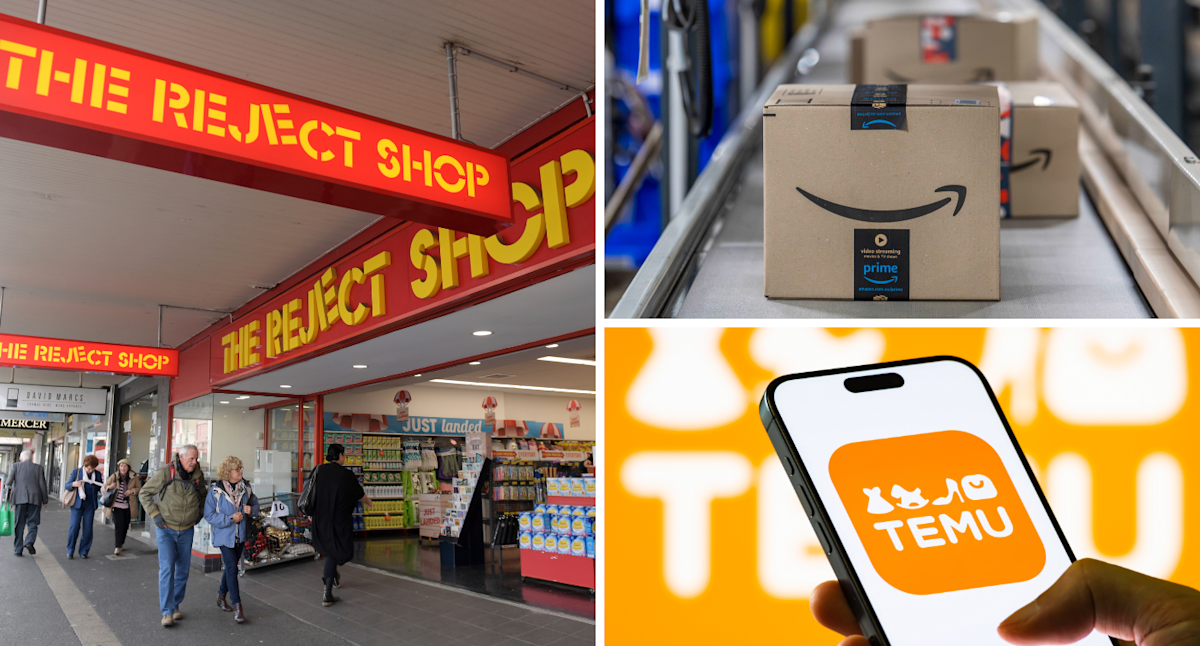The Reject Shop has dropped in low-price perception rankings by Roy Morgan, while overseas retailers Temu and Shein have risen. (Source: AAP/Amazon/Getty)
Ultra-low-cost online retailers Temu, Shein and Amazon are redefining what Australian consumers view as “normal” prices and changing expectations about what a “cheap” deal really is. The shift is coming at a cost to traditional discount stores, with The Reject Shop suffering the biggest blow.
Chinese giants Temu and Shein, and US behemoth Amazon, have completely shaken up the retail space in Australia with their low-cost models. The three online disruptors have experienced a rapid rise in Down Under, gaining millions of shoppers in the last year alone.
New research by Roy Morgan found heavyweights Kmart and Big W continue to lead on low price perception, with 58 and 45 per cent of consumers associating the brands with having “low prices”.
RELATED
Despite this, the traditional discount stores are losing their hold on consumers when it comes to their perception of cheap deals. The Reject Shop has experienced the biggest drop, down 18 percentage points in the rankings since 2020. The store was bought by low-cost Canadian retailer Dollarama earlier this year for $259 million and will be completely rebranded by the end of 2027.
Big W suffered the second biggest drop, down 10 percentage points, followed by Target, which was down 7 percentage points.
At the same time, Temu’s association with low prices has risen from 34 to 41 per cent to rank in third place. Meanwhile Shein gained from 23 to 27 per cent.
Do you have a story to share? Contact tamika.seeto@yahooinc.com
Roy Morgan’s head of retail and consumer products Catherine Jolley said cheap was simply getting “even cheaper”.
“The rise of ultra-low-cost online marketplaces is recalibrating what consumers now consider a ‘normal’ price. The traditional price anchors, those mental reference points we all have for how much something should cost, have collapsed in some categories,” she said.
“Players like Temu, Shein, Amazon and soon Dollarama, are resetting those anchors and dragging price expectations down across the board.”
Jolley noted the shift wasn’t being seen across all items and was more pronounced in discretionary categories like clothing, compared to other categories like hardware which have held their ground.
“The result? Pricing and positioning strategies are under real pressure, and it’s forcing many retailers to rethink where and how they compete,” she said.
Story Continues
Traditional discount retailers have seen declines in the Roy Morgan measure, while online retailers Temu, Shein and Amazon have seen gains. (Source: Roy Morgan)
Temu, Shein and Amazon have come under fire from Aussie bosses in recent days.
Australia Post CEO Paul Graham has warned Amazon, Temu and Shein will control half of the online market in Australia by the end of the decade unless Aussies get off “this drug of the cheapest product” and rally behind Australian businesses.
“Our research shows us that by about 2030, Amazon and the other key platform players, Temu and Shein, will control around 50 per cent of the online market in Australia. It’s about 25 per cent today,” Graham told The Daily Telegraph.
Wesfarmers CEO Rob Scott has called on the federal government to make the likes of Shein and Temu operate on an even playing field in Australia.
“Competition benefits businesses and customers, but when regulation and taxes unfairly disadvantage some businesses, it leads to higher prices and puts Australian jobs at risk,” Scott, who is the boss behind brands like Kmart, Target, Bunnings and Officeworks, told The Australian.
Scott previously pointed to Temu and Shein following the closure of its online marketplace Catch, noting a “significant increase in competitive intensity” as a reason behind the decision.
Temu meanwhile was awarded a CHOICE Shonky Award this week, with the consumer group giving the dishonour to the e-commerce platform “for being an unsafe haven for dodgy sales tactics and fast fashion”.
Roy Morgan found Temu has nearly $2.6 billion in annual sales in the 2025 financial year, compared to $1.6 billion a year ago. Shein had nearly $1.3 billion in annual sales, compared to $1 billion a year ago.
A staggering 8.8 million Australians were found to be buying at least once from Amazon over the 12 month period, while 4.7 million bought from Temu and 2.6 million from Shein.
It comes as Australia sees the demise of multiple retailers, including the likes of Millers, Rivers, Noni B, Katies, Autograph, Crossroads and Rockmans.
Get the latest Yahoo Finance news – follow us on Facebook, LinkedIn and Instagram.

